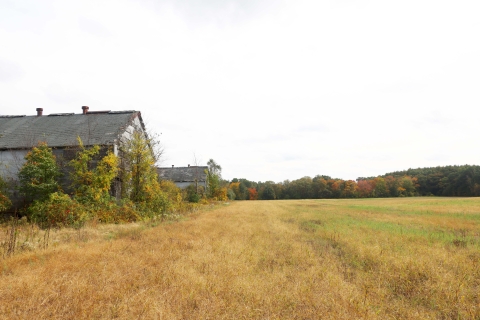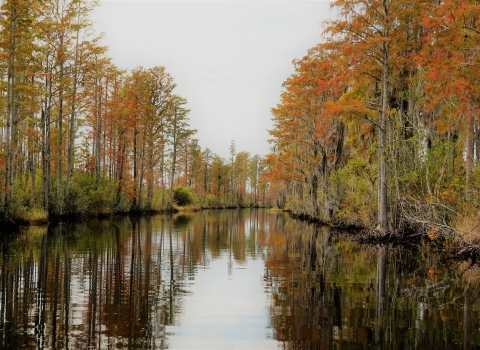Land offers a connection to nature, to ourselves, and to the spirit that guides us. On the small farm known as Meadowood in Simsbury, Connecticut, a young Martin Luther King, Jr., was able to discover himself, expanding his horizons during the time he worked there.
With the help of a grant from the U.S. Fish and Wildlife Service, the property was purchased by the Town of Simsbury in October 2021 for the purposes of protecting this cherished piece of land and history.
“This site is the story of our connected past, but also, of our future,” said Charles Warner Jr., a Morehouse College graduate and chair of the Connecticut Freedom Trail. Warner expressed his gratitude for the many people who worked together in the spirit of collaboration and of love for the community and history to preserve this site.
Warner said the land at Meadowood is special because it has made an impression on so many people, including attendees of Morehouse, the historically black men’s college in Atlanta, Georgia. In the summer months, during both World Wars and continuing beyond the mid-20th century, Morehouse students traveled north to this farm and worked the tobacco fields, earning money for their tuition.
“Their experiences here shaped them,” said Warner. “Shaped their bodies, shaped their minds, and their spirits; and inspired them to go on and do wonderful things in the world. One of those people, one of the most prominent folks, was a young Michael Reese King, Jr., also known as Martin Luther King Jr.”
The opportunity to work on this farm and break away from the racially divided South gave young Dr. King a new perspective on what life could be like. Dr. King visited Meadowood during his first year of college in 1944, at the age of 15, and again in 1947. His youth and optimism allowed him to be inspired. His time here helped shape his future.
“In addition to Martin Luther King, this site has touched other historical figures,” Warner said. “One being Atlanta’s first African American mayor, Maynard Jackson, who spent time here. Also, this site was one of the reasons Washington, D.C.’s first African American mayor, Marion Barry, decided not to attend Morehouse College; he said he had spent enough time doing manual labor, and the only way he could have paid for his time at Morehouse was through his work on these tobacco fields.”
The 288-acre Meadowood parcel, formerly a Cullman Brothers farm, can be found along Firetown and Hoskins roads in Simsbury. The farmland will offer agricultural opportunities to local farmers; the wooded areas will offer habitats for wildlife; and the trails will give people an opportunity to connect with nature.
Many sources of funding were integral in conserving the land at Meadowood. Protecting this parcel was a tremendous effort by The Trust for Public Land, who succeeded at combining funds from the Highlands Conservation Act Program; the Town of Simsbury; several state agencies including the Department of Agriculture, Connecticut Department of Energy and Environmental Protection (DEEP), and the State Historic Preservation Office; in addition to generous private donors.
One of the funding sources, the Highlands Conservation Act Program, is administered by the Service’s Wildlife and Sport Fish Restoration Program. The grant program works to preserve wildlife habitats, access to clean drinking water, and create areas of climate resilience. The Highlands Program contributed a significant portion of the funding through a grant to Connecticut DEEP, which now holds a conservation easement conservation easement
A conservation easement is a voluntary legal agreement between a landowner and a government agency or qualified conservation organization that restricts the type and amount of development that may take place on a property in the future. Conservation easements aim to protect habitat for birds, fish and other wildlife by limiting residential, industrial or commercial development. Contracts may prohibit alteration of the natural topography, conversion of native grassland to cropland, drainage of wetland and establishment of game farms. Easement land remains in private ownership.
Learn more about conservation easement on roughly 130 acres, protecting the natural resources and woodlands.
“The Meadowood property is important not only because of its value to wildlife, but because of its historical and cultural significance. Preserving it helps us honor the ongoing legacy of Dr. Martin Luther King Jr.,” said Wendi Weber, North Atlantic-Appalachian Regional Director for the U.S. Fish and Wildlife Service. “Here, visitors can walk the same ground that Dr. King worked on years before. The property is a unique matrix of dense forests, open fields, and weathered barns. It is a place where people can connect with nature and reflect on the beauty and history sewn into this landscape.”
Walker Holmes, Connecticut State Director for The Trust for Public Land, said the process of conserving this property was long and arduous, but meaningful. Through the support of the community, she and her team were able to successfully protect the site in perpetuity.
“Meadowood is emblematic of The Trust for Public Land’s work to connect people to land, and to each other,” she said. “Community is at the center of everything that we do, and this place and all of the people who care about it, near and far, are what make a strong community.”
Holmes said many people worked tirelessly to keep this effort going and see it through to completion. She is grateful for all the time each person contributed to make this dream a reality and is excited for the future.
“We’re not done yet,” said Holmes. “We still have work to do. There are barns and tobacco sheds to fix; there are trails to build; there’s history to preserve; and there are stories to tell. And we are so excited for the next chapter of Meadowood with all of you.”






